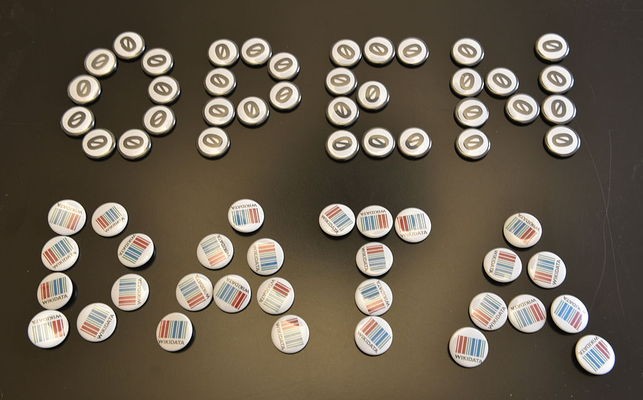
By María Velasco
Digital tools open many possibilities for the development of new ideas. They allow us to draw a map of the forest fires that have taken place in Spain during the last few years, or let anyone carry a sensor for evaluating city environments though the use of an electronic board.
These ideas have been put into play in real projects. Furthermore, they allow the possibility of replicating similar initiatives with no need to start from scratch. The first example is a webpage called España en llamas (Spain in flames) where, apart from showing at a glance the extent, causes, victims and costs of each fire, project promoters can use these data to write reports explaining the situation.
The second example, Smart Citizen, is free hardware and software-based board which, among other things, has been used in a test to measure air quality in the city of Amsterdam. The data culled from volunteers carrying these small devices can be used to generate visual statistics, allowing for more detailed knowledge about the cities we live in.
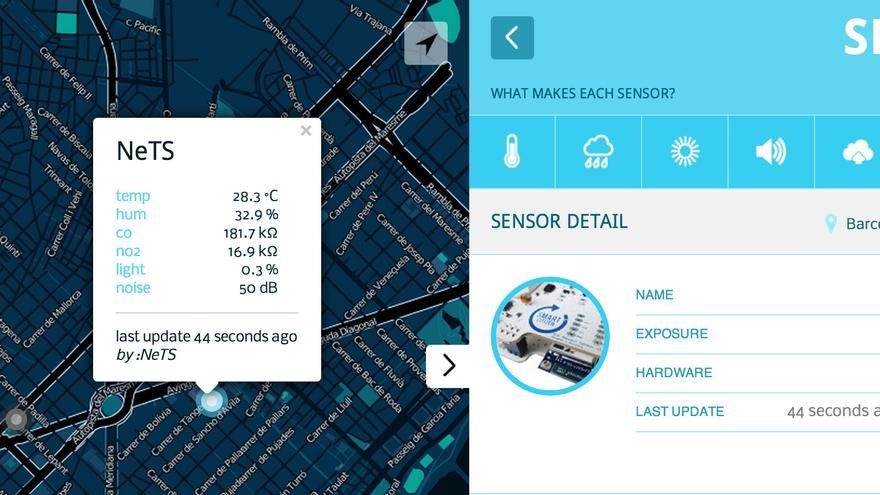
Both projects, financed through Goteo, have a several common characteristics also reflected in other initiatives financed through this crowdfunding platform.
-
They are open, given that the technology they generate is open source. In other words, the source code being used to develop the website or app is freely accessible and can be copied, modified or distributed under the same conditions.
-
As a quality, this openness also includes the types of projects which generate information and/or open knowledge. Some examples would be: methodologies, programmes, didactic manuals, etc)
-
They allow for the replication of data: this openness allows others to develop their own versions of the platforms and products involved, therefore increasing the generation of knowledge. Under this philosophy, projects publish the computer code developed for the app and the data used under free licenses. That is, if someone wants to generate visualizations or write something about the fires that took place in a particular region, this person can use the information and technology offered by Spain in Flames by agreeing to the terms of the latter’s license.
-
They work with data: public administrations regularly publish large quantities of data; meanwhile other data exists which, whether originating from institutions or not, is used by project promoters as well as the data generated by the communities behind these initiatives; these are the prime sources. In the words of Adolfo Antón, coordinator for Medialab-Prado’s Data Journalism group, “Openness has taken over the world of data”.
-
They communicate visually: there are many examples of Goteo projects that have made an extra effort in offering their data to the end user, a quality also applicable to the crowdfunding platform itself. This allows for the generation of data visualizations which allow anyone to quickly understand whatever is being reflected.
We have started by describing two concrete projects using data as a public service for spreading information. This “data fever” is infecting enterprises, institutions, the educational world and media with terms like "big data" or "smart cities", but in the last three years smaller organizations have been exploiting the potential of data as raw material.
Generating value and data
There is a growing number of civic-oriented applications using data, technology and collective intelligence to improve our quality of life, democratic knowledge, journalism, the collaborative economy, etc. Many of these have been funded through Goteo, something which the crowdfunding platform and its managing non-profit foundation have duly noted: Tu derecho a saber, Fixmedia.org, Qué hacen los diputados, ¿Quién cobra la obra?, Social to crowd …
These projects have generated both data and value since their conception and their ongoing functioning has helped us to understand the new socio-economic panorama. Moreover, they laid the basis of a different way of doing things, where knowledge can expand and augment, rather than stagnate.
Nagore de los Ríos, founder of the Outreach Box project and consultant for the World Bank, has remarked on the “humanized” benefits resulting from the use of open source: “It creates a great community, freedom, a lot more knowledge, savings and increased efficacy and efficiency”.
Complementing those organizations which have promoted social justice, fair trade, and local human development in the last few years, we also find a series of collectives combining characteristics from the traditional business background with elements of social entrepreneurship.
These collectives are aware of the urgent necessity of going beyond the SCR measures (Social Corporate Social Responsibility) and are beginning to implement reformist models such as “the economy of a common good", a movement based on more socially responsible and sustainable values than those posited by capitalism in areas such as ownership, wage politics, productive model, ecological footprint, etc.
At the same time, reusable code generated in the digital realm reflects these same principles. As De los Ríos points out: “Highlighting the value of Open Source is no easy task, but it's being achieved, step by step. It's like recycling; you have to explain it first and not everybody gets it, as users may not see the direct benefits. Nowadays, no one questions recycling. I hope that someday no one will question the reuse of open source code”.
API: the key for a new development model
While these projects contain many aspects generating value in their own right, it's important to highlight a technological feature that allows projects to be “multiplied”. The tool enabling this is know as API (Application Programming Interface). It is a secure “access key” for web-based software functions or services which can be used by third parties without the intervention of the original authors.
Some of the best known APIs of recent times are exemplified by large companies that are starting to practice the “API economy”. Google Maps, for example, allows contributors to add data and useful information to its maps, facilitating custom searches or personalised functions within applications.
Twitter has enabled the creation of multiple apps and different web services based on their API. In the case of Paypal, electronic payments may be carried out using individual systems without needing to access or operate within Paypal's website.
Adolfo Antón has also highlighted the importance of openness in certain APIs: “If sharing code means enabling that code with a free software-compatible license, that's perfect.”
He adds that making these APIs available in open repositories such as GitHub “opens the door for facilitating and empowering peer-to-peer collaboration in all types of projects...It's what allows us to have free software and all manner of collaborative products”. He also notes that this takes place in a number of very diverse - and sometimes interrelated - fields such as science, academia, universities, politics, citizen affairs, journalism or statistics.
Goteos co-founder Olivier Schulbaum points out that supporting an API and, specially, open source interfaces “represents a new development model towards greater flexibility, simplicity and adaptation, without being dependent on the complete code's framework”.
In this sense, APIs are also used to allow certain apps, programs and desktop widgets access data or process transactions in the “mother” app, an important feature for optimizing services across multiple devices. Goteo has compiled all of the APIs generated in the projects they’ve helped finance in the same location.
Goteo’s data generates value
Goteo kicked off spring 2015 with its own contribution to the community of data and projects with “open DNA”. Their new open API, together with developer documentation created with the support of the European Cultural Foundation, aims to help project leaders use the data generated by the platform to increase the efficiency and management of campaigns in order to better their chances of success.
Impact stats for the crowdfunding campaigns may be published in real time and data can be contrasted with other websites and databases ( for example, Twitter, Google Maps or Facebook’s API). This will improve tracking quality for elements such as campaign disseminations, geolocation for co-financers’ contributions, etc. In Schulbaum’s opinion, “It improves user experience for project promoters”.
Additionally, project promoters (or any other person) can create their own interactive visualizations based on crowdfunding campaign data or access previous examples of these, something that can be added to the knowledge base generated around crowdfunding and new models of distributed finance. The first visualisations have been produced by the Outliers Collective.

Three types of economy that share values
According to the media and the blogosphere, Goteo’s identity has always fallen somewhere between the Open Source Economy, the Solidarity Economy and the Collaborative Econtomy. This corresponds with Goteo’s goal of consolidating practical and experimental practises around transversal values within these three fields.
According to Olivier Schulbaum, the liberation of data that accompanies these campaigns, apart from improving the platform’s efficacy and impact, can be used to create bridges between those three ways of practising economic relations and bolster the move towards open social entrepreneurship. This coincides with Jeremiah Owyang’s analysis: The public will expect start ups to share the value, new software and “open source cooperation” created with the people to offer solutions.
Within the collaborative economy, open data could fill a niche and reach a level of importance which has yet to be exploited. A viewpoint ratified by Aragón Open Data technical advisor (and winner of one of the OKFN Spain 2015 prizes) José Mª Subero, who believes that apart from providing benefits and services to citizens, opening data can also be used to create apps. In his opinion, the way forward involves “improving processes and generating value with new information layers”.
There are almost 60 institutional open data portals in Spain, according to the CTIT Foundation. It seems that the general intention underlying this trend is that liberated public data is seen as a useful thing for citizens in the eyes of the administration. It is also true that more data is liberated each time citizens petition for more data, and the most popular petitions are liberated first.
On the other hand, there are private and public organizations which also rely on citizens collaborating in data generation. This opens the debate on whether the collaborative economy can generally be considered an on-demand economy, where the data generated is absorbed by centralized organizations, especially where new digital economy enterprises are concerned.
In answer to these issues, Goteo is keen to invite other European crowdfunding platforms to adopt standards for the generation of open data and tools, in order to share value and impact. This is knows as the “3 O’s” which Goteo would like to achieve: Open data, Open knowledge and Open code.

Your contribution to data: Goteathon at Medialab-Prado
Goteo was present for the “OJO AL DATA” (Check out our data : data culture, economics and politics) event held at Medialab-Prado on May 28th and 29th. More specifically, our event was a Goteathon - a hackathon directed at people interested in open data, APIs and visualizations - to help platform members conceive and develop new standards in the world of crowdfunding while also contributing to the civic commons.
In accordance with Goteo.org’s principles as one of the world’s only crowdfunding platforms that is licensed and accessible as free software, and working only with projects capable of generating collective returns, we put out a call to developers, data visualization experts, researchers and other people who were interested and eager to explore statistics that could be developed and experimented with in Goteo’s new API.
The two day event was dedicated to improving the API: generating new visualizations drawn from Goteo’s crowdfunds, consolidating a functional standard that could boost relationships between resources, needs, people and open projects while discovering knowledge and people with similar concerns.
We invite you to explore the API, the documentation and the first visualizations, and to join some of the online working groups, including:
-
A group for basic visualizations and stats: for beginner programmers, and/or for those who want to get their hands on things that could use improvement.
-
A group for explorations and conclusions: for more "discursive" people and fans of hypotheses, and how to confirm them.
-
A group on “feeder” or matchfund capital and "CSR multipliers": to motivate those with a stake in the future of Goteo in strengthening match-funding and new institutional agents.
-
A mobile group, for more expert skills, API tracking for mobile devices: to put user experience and donation impact right in your pocket.
-
A “free ride” group: for those who don’t want to say where they’re going, but still want to join us in exploring and developing any particular area...based on Goteo data and API, of course :)
References
Albert Cañigueral. 5 predicciones de Jeremiah Owyang sobre economía colaborativa para el 2015. http://www.consumocolaborativo.com/2014/12/11/5-predicciones-de-jeremiah-owyang-sobre-economia-colaborativa-para-el-2015/
José Manuel de la Chica. Hacia la apertura digital de la empresa y la universalización de la economía de las API. Harvard Deusto Business & Technology. http://www.harvarddeustobt.com/economia-de-las-api/
Raúl Magallón Rosa (2014). Tecnologías cívicas y participación ciudadana. Revista de estudios de juventud. https://www.academia.edu/9328972/_Tecnolog%C3%ADas_c%C3%ADvicas_y_participaci%C3%B3n_ciudadana_
Goteo. Bien(es) común(es) = Bien social de código abierto. En https://goteo.org/blog/1236
Goteo. La primavera de Goteo: baja la comisión, suben nuestros valores. https://goteo.org/blog/5088
Goteo. Midiendo el impacto de los retornos de campañas #MadeInGoteo. https://goteo.org/blog/5251
Jeremiah Owyang. 2015: The year of the crowd. http://www.slideshare.net/jeremiah_owyang/leweb-deck-2015-the-year-of-the-crowd/1
Jeremiah Owyang. Collaborative Economy Honeycomb 2 –Watch it Grow. http://www.web-strategist.com/blog/2014/12/07/collaborative-economy-honeycomb-2-watch-it-grow/
Lisa Gansky. Collaborative Economy Companies Need To Start Sharing More Value With The People Who Make Them Valuable. http://www.fastcoexist.com/3038476/collaborative-economy-companies-need-to-start-sharing-more-value-with-the-people-who-make-th




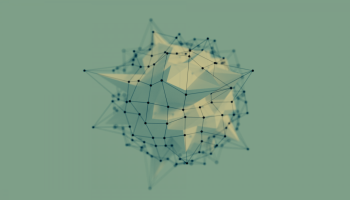
 Joan B. Cabot
Joan B. Cabot 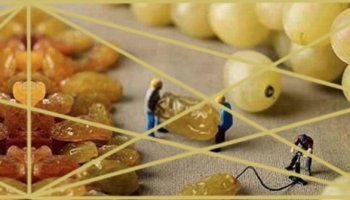
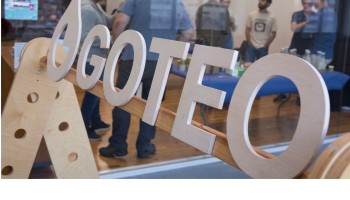
 Manuela Frudà
Manuela Frudà